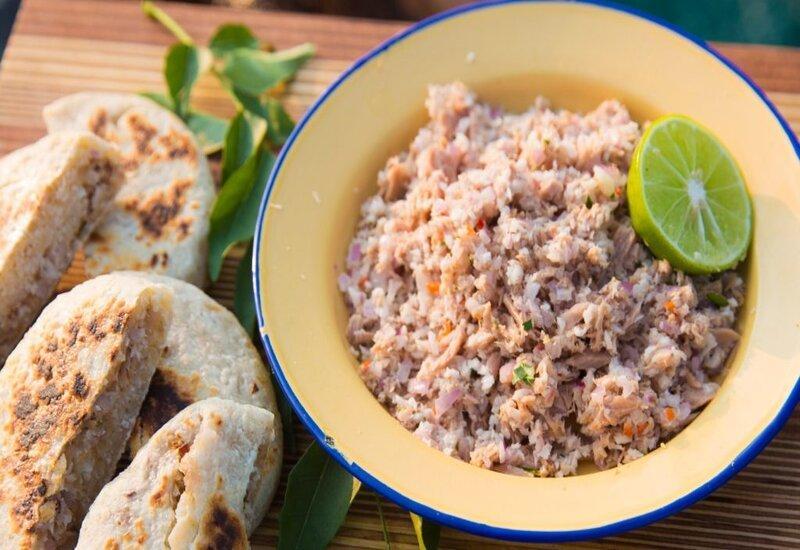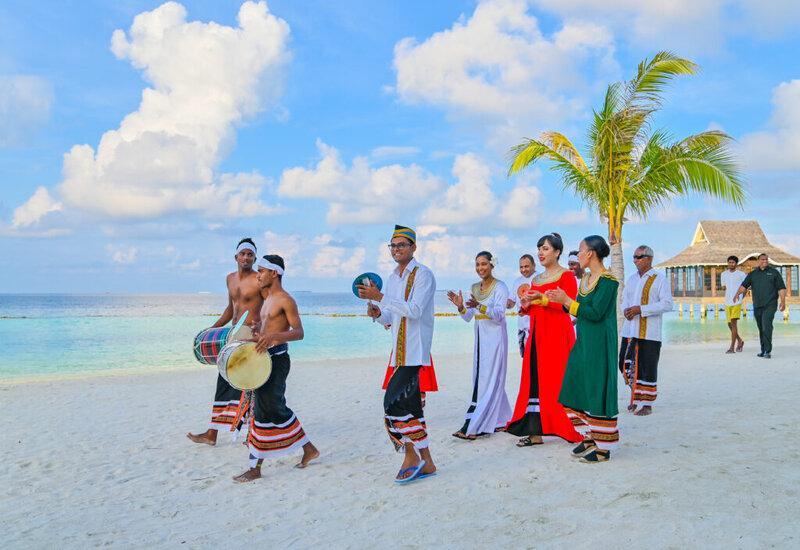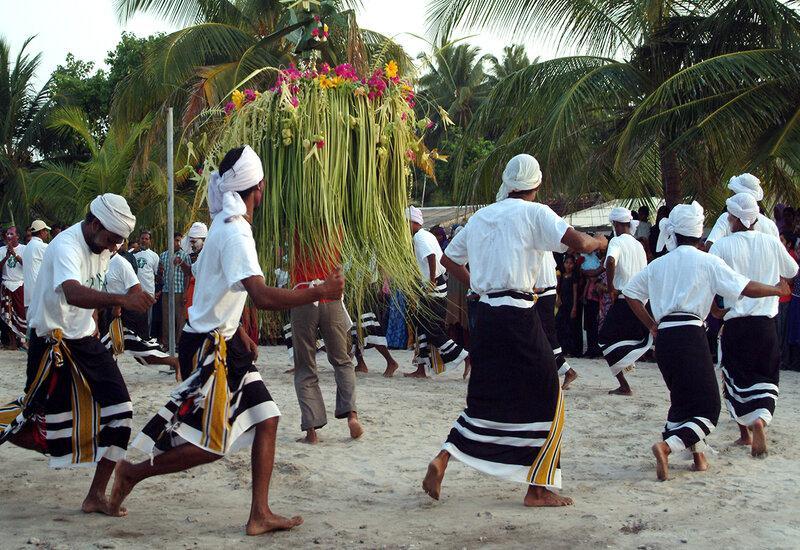


Maldives, a nation of 1192 islands in the Indian Ocean, mesmerizes the discerning traveler with its unique & exotic geography – house reefs with incredible underwater life around it, tiny jewel-like islands rimmed with whitest of soft sand and surrounded by the clearest of turquoise blue shallow waters, Maldives is a perfect destination for an ideal summer holiday vacation. Relax . Rejuvenate . Revive!
Let us delve a little into the culture and traditions of the Maldives… Although home to just over half a million people, the Maldives has its very own unique culture and traditions. Being heavily influenced by the Arabic, Indian, Srilankan and even African cultures, the Maldivian culture, craft & traditions have been shaped by the island environment and the Indian ocean that surrounds the country.
Dhivehi is the primary language of the Maldivians and the script – Thaana was developed from Arabic numerals around the 16th century and is unique to the country. Maldivians are master boat builders. The traditional Maldivian boat – Dhoni has been shaped over centuries, resulting in a craft that perfectly suits the various conditions of the ocean, that embraces the Maldives from all sides. There is a rich tradition of Maldivian crafts too – lacquered wooden ornaments, finely woven reed mats & coral carvings are hand-made crafts, that have been passed down through several generations.
In 1153 AD, the entire Maldivian community converted to Islam and the religion has transformed & introduced new fundamentals to the Maldivian culture. With a predominately Muslim faith, Maldivians are quite conservative and wear traditional dresses. Males wear a sarong and white cotton shirt, while females wear a traditional Dhiveli Libaas & Feyli, which is a long, colourful dress entwined with gold & silver threads. All tourists visiting the Maldives must be properly clothed while swimming on the beaches that are in the MAIN island of Maldives – Male` (Capital city) OR on beaches that are located on inhabited islands. Having said this, this restriction does NOT apply to any of the Maldives island resorts that you would stay in, when you visit the Maldives as a tourist. All guests in these island resorts are free to soak up the sunshine in whatever swimming attire or beach clothing they please to wear and most importantly, there are no restrictions whatsoever on these island resorts.
Traditionally, the island communities are very close-knit. This togetherness continues to prevail in the small island communities of the Maldives. Accordingly, men will be mainly engaged in fishery, carpentry, boat building and masonry. Women are mainly engaged in household duties and raising families. Certain rituals and practices were followed in the islands on special occasions like weddings. Some of these rituals survive to this day. The advent of tourism in the 1970’s accelerated the modernisation process of the country. Today an increasing number of women hold crucial positions within the public and private sector. As a result of economic growth and overall development, lifestyle changes have been quite dramatic. Today, Maldives follows the moderate path of Islam and they truly believe in peace, harmony and co-existence, with religion being very personal to the Maldivian!
In music and dance, you will be pleasantly surprised to recognise an African rhythm to the Maldivian music. The Boduberu, a traditional Maldivian dance, illustrates this perfectly. The language accompanying this dance, followed by the rhythm of the drums, will take you to the Middle East & Africa. Other music as well as some of the culinary specialties has close affinity to the African & Indian influences on the Maldivian culture. Local islanders consume a lot of spices, including curry. The traditional Maldivian food is hot & spicy, featuring lot of curries & soups served with rice. Fish – especially Tuna, Garudhiya (Fish Soup), Mas Huni (Shredded Smoked Tuna) and Roshi (flour bread) are their staple & go-to food. Some of the Maldivian snacks like Gulas, Bhajjiyas, Bis Keemiyas, Bokkibaas and Mas Roshis are absolutely delicious and a MUST TRY during your stay. The unique Maldivian Chilly – Geetheyo Mirus, a Habanero variety is a HOT, spicy, tangy, lemony variety of chilli and it just blends beautifully with the coconut milk and otherspices within a mouth-watering Maldivian curry. Coconuts, yams, mangoes and pineapples are also locally grown and they are very tasty too.
Alcohol & pork consumption is banned in all inhabited islands and the capital island – Male`. However, for a tourist who is staying in any of the Maldives island resorts, there are NO restrictions with regards to alcohol consumption & pork, during their stay. There are numerous resorts offering different types of All Inclusive packages with alcohol & pork inclusions OR you could use the services of high-profile bars in all resorts during stay without any restriction. It is important to note that import of alcohol or any pork items whilst coming to the Maldives is prohibited and these items will be impounded at the airport upon arrival.
Ready to book a holiday to the Maldives?! Travel Escapes Maldives has a variety of resorts options within the Luxury segment to cater to all your needs. The team is happy to create customised itineraries as per your requirement. For further details, please visit www.travelescapesmaldives.com .